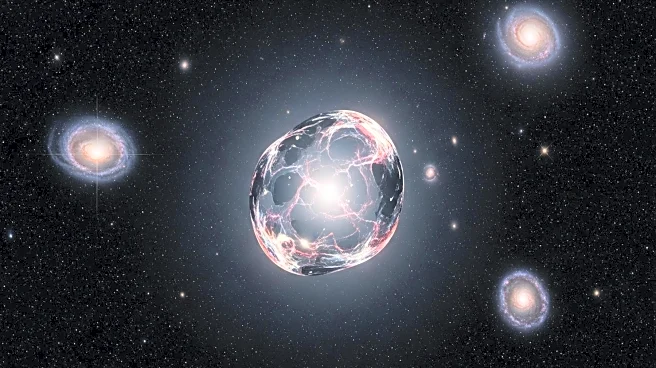What is the story about?
What's Happening?
A recent study by Rajendra P. Gupta, an adjunct physics professor at Ottawa University, proposes a groundbreaking theory that questions the existence of dark matter and dark energy. Traditionally, these unseen forces are believed to constitute about 95% of the universe, with dark matter providing extra gravity to hold galaxies together and dark energy driving the universe's expansion. Gupta's research suggests that instead of these invisible components, the fundamental laws of nature might be evolving as the universe ages. This hypothesis, known as the CCC+TL model, posits that the universe's constants, such as the speed of light and gravity, may not be fixed but could change over time, potentially mimicking the effects attributed to dark matter and dark energy.
Why It's Important?
If Gupta's theory holds true, it could revolutionize the fields of physics and astronomy by eliminating the need for dark matter and dark energy as explanations for cosmic phenomena. This would redirect scientific efforts from searching for elusive particles to studying the changing cosmic constants. Such a shift could lead to new insights into galaxy formation, the universe's expansion, and the conditions necessary for life. The implications extend beyond academia, offering a more intuitive understanding of the universe's workings and potentially rewriting cosmic history with a longer-lived universe governed by evolving laws rather than mysterious forces.
What's Next?
The CCC+TL model faces several challenges before it can be widely accepted. It must be tested against gravitational lensing, a phenomenon well-explained by dark matter, to see if it can provide a comparable explanation. Additionally, the model's assumptions, such as treating galaxies as spheres, need refinement to account for their actual shapes. Further research and testing are required to validate Gupta's theory, which, if successful, could significantly alter the current understanding of cosmology and the universe's fundamental nature.
Beyond the Headlines
Gupta's theory, if proven, could have profound ethical and philosophical implications by challenging the notion of a universe dominated by unseen forces. It suggests a cosmos governed by laws that are more accessible and quantifiable, potentially demystifying the universe and making it more comprehensible to the public. This perspective could inspire a new era of scientific inquiry focused on understanding the dynamic nature of cosmic laws and their impact on the universe's evolution.
















